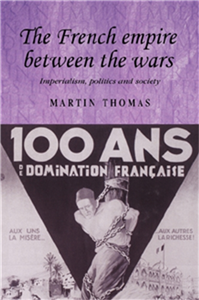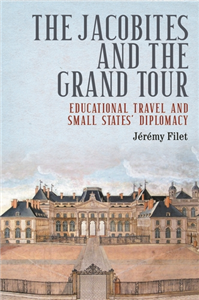Your Search Results
-
Rebo International B.V.
For over 35 years Rebo International B.V. has been publishing highly attractive non-fiction books for both adult and children. We have a wide range of bestsellers to offer: from 200 Years in Photography to The Icon Series, and from children’s activity books to fairy tales and book+.
View Rights Portal
-
Promoted ContentHumanities & Social SciencesMarch 2017
Migrant races
Empire,Identity and K.S. Ranjitsinhji
by Andrew Thompson, John M. MacKenzie, Satadru Sen
This book is a study of mobility, image and identity in colonial India and imperial Britain in the late nineteenth and early twentieth centuries. It is a model for studies of migrant figures like K.S. Ranjitsinhji who emerged during the imperial period. Ranjitsinhji is an important figure in the history of modern India and the British empire because he was recognized as a great athlete and described as such. The book focuses on four aspects of Ranjitsinhji's life as a colonial subject: race, money, loyalty and gender. It touches upon Ranjitsinhji's career as a cricketer in the race section. The issue of money gave Indian critics of Ranjitsinhji's regime the language they needed to condemn his personal and administrative priorities, and to portray him as self-indulgent. Ranjitsinhji lived his life as a player of multiple gender roles: sometimes serially, and on occasion simultaneously. His status as a "prince" - while not entirely fake - was fragile enough to be unreliable, and he worked hard to reinforce it even as he constructed his Englishness. Any Indian attempt to transcend race, culture, climate and political place by imitating an English institution and its product must be an unnatural act of insurgency. The disdain for colonial politics that was manifest in the "small rebellions" at the end of the world war converged with the colonized/Indian identity that was evident at the League of Nations. Between the war and his death, it is clear, Ranjitsinhji moved to maximize his autonomy in Nawanagar.
-
Promoted Content
-
 Trusted Partner
Humanities & Social SciencesSeptember 2013
Trusted Partner
Humanities & Social SciencesSeptember 2013Lisbon rising
Urban social movements in the Portuguese Revolution, 1974–75
by Pedro Pinto
Lisbon rising explores the role of a widespread urban social movement in the revolutionary process that accompanied Portugal's transition from authoritarianism to democracy. It is the first in-depth study of the widest urban movement of the European post-war period, an event that shook the balance of Cold War politics by threatening the possibility of revolution in Western Europe. Using hitherto unknown sources produced by movement organisations themselves, it challenges long-established views of civil society in Southern Europe as weak, arguing that popular movements had an important and autonomous role in the process that led to democratisation, inviting us to rethink the history and theories of transitions in the region in ways that account for popular agency. Lisbon rising will be of interest not only to students of twentieth-century European history, but across disciplines to students of democratisation, social movements and citizenship in political science and sociology. ;
-
 Trusted Partner
Humanities & Social SciencesApril 2020
Trusted Partner
Humanities & Social SciencesApril 2020Early modern war narratives and the Revolt in the Low Countries
by Raymond Fagel, Leonor Álvarez Francés, William G. Naphy, Beatriz Santiago Belmonte
-
 Trusted Partner
Humanities & Social SciencesApril 2007
Trusted Partner
Humanities & Social SciencesApril 2007The French empire between the wars
Imperialism, politics and society
by Martin Thomas, Andrew Thompson, John Mackenzie
By considering the distinctiveness of the inter-war years as a discrete period of colonial change, this book addresses several larger issues, such as tracing the origins of decolonization in the rise of colonial nationalism, and a re-assessment of the impact of inter-war colonial rebellions in Africa, Syria and Indochina. The book also connects French theories of colonial governance to the lived experience of colonial rule in a period scarred by war and economic dislocation. ;
-
 Trusted Partner
Humanities & Social SciencesMarch 2017
Trusted Partner
Humanities & Social SciencesMarch 2017The French empire between the wars
Imperialism, politics and society
by Martin Thomas
By considering the distinctiveness of the inter-war years as a discrete period of colonial change, this book addresses several larger issues, such as tracing the origins of decolonization in the rise of colonial nationalism, and a re-assessment of the impact of inter-war colonial rebellions in Africa, Syria and Indochina. The book also connects French theories of colonial governance to the lived experience of colonial rule in a period scarred by war and economic dislocation.
-
 Trusted Partner
Literature & Literary StudiesJanuary 2013
Trusted Partner
Literature & Literary StudiesJanuary 2013Popular protest in late-medieval Europe
Italy, France and Flanders
by Samuel Kline Cohn
The documents in this stimulating volume span from 1245 to 1424 but focus on the 'contagion of rebellion' from 1355 to 1382 that followed in the wake of the plague. They comprise a diversity of sources and cover a variety of forms of popular protest in different social, political and economic settings. Their authors range across a wide political and intellectual horizon and include revolutionaries, the artistocracy, merchants and representatives from the church. They tell gripping and often gruesome stories of personal and collective violence, anguish, anger, terror, bravery, and foolishness. Of over 200 documents presented here, most have been translated into English for the first time, providing students and scholars with a new opportunity to compare social movements across Europe over two centuries, allowing a re-evaluation of pre-industrial revolts, the Black Death and its consequences for political culture and action. This book will be essential reading for those seeking to better understand popular attitudes and protest in medieval Europe.
-
 Trusted Partner
Literature & Literary StudiesFebruary 2023
Trusted Partner
Literature & Literary StudiesFebruary 2023Imagining the Irish child
Discourses of childhood in Irish Anglican writing of the seventeenth and eighteenth centuries
by Jarlath Killeen
This book examines the ways in which ideas about children, childhood and Ireland changed together in Irish Protestant writing of the seventeenth and eighteenth centuries. It focuses on different varieties of the child found in the work of a range of Irish Protestant writers, theologians, philosophers, educationalists, politicians and parents from the early seventeenth century up to the outbreak of the 1798 Rebellion. The book is structured around a detailed examination of six 'versions' of the child: the evil child, the vulnerable/innocent child, the political child, the believing child, the enlightened child, and the freakish child. It traces these versions across a wide range of genres (fiction, sermons, political pamphlets, letters, educational treatises, histories, catechisms and children's bibles), showing how concepts of childhood related to debates about Irish nationality, politics and history across these two centuries.
-
 Trusted Partner
Humanities & Social SciencesApril 2025
Trusted Partner
Humanities & Social SciencesApril 2025The Jacobites and the Grand Tour
Educational travel and small-states' diplomacy
by Jérémy Filet
In the first monograph to fully examine the intersecting networks of Jacobites and travellers to the continent, Filet considers how small states used official diplomacy and deployed soft power - embodied by educational academies - to achieve foreign policy goals. This work uses little-known archival materials to explain how and why certain small states secretly supported the Jacobite cause during the crucial years surrounding the 1715 rising, while others stayed out of Jacobite affairs.At the same time, the book demonstrates how early modern small states sought to cultivate good relations with Britain by attracting travellers as part of a wider trend of ensuring connections with future diplomats or politicians in case a Stuart restoration never came.This publication therefore brings together a study of Britain, small states, Jacobitism, and educational travel, in its nexus at continental academies.
-
 Trusted Partner
Humanities & Social SciencesMarch 2017
Trusted Partner
Humanities & Social SciencesMarch 2017Air power and colonial control
by David Omissi
Air policing was used in many colonial possessions, but its most effective incidence occurred in the crescent of territory from north-eastern Africa, through South-West Arabia, to North West Frontier of India. This book talks about air policing and its role in offering a cheaper means of 'pacification' in the inter-war years. It illuminates the potentialities and limitations of the new aerial technology, and makes important contributions to the history of colonial resistance and its suppression. Air policing was employed in the campaign against Mohammed bin Abdulla Hassan and his Dervish following in Somaliland in early 1920. The book discusses the relationships between air control and the survival of Royal Air Force in Iraq and between air power and indirect imperialism in the Hashemite kingdoms. It discusses Hugh Trenchard's plans to substitute air for naval or coastal forces, and assesses the extent to which barriers of climate and geography continued to limit the exercise of air power. Indigenous responses include being terrified at the mere sight of aircraft to the successful adaptation to air power, which was hardly foreseen by either the opponents or the supporters of air policing. The book examines the ethical debates which were a continuous undercurrent to the stream of argument about repressive air power methods from a political and operational perspective. It compares air policing as practised by other European powers by highlighting the Rif war in Morocco, the Druze revolt in Syria, and Italy's war of reconquest in Libya.
-
 Trusted Partner
November 2019
Trusted Partner
November 2019Rising
Terra #2
by Jager, Jennifer Alice
Die epische Endzeitreihe mit Suchtfaktor geht in die nächste Runde. Der Kampf von Mensch gegen Natur wird noch spannender, noch dramatischer, noch nervenaufreibender! Terras Naturkatastrophen stürzen die Welt immer mehr ins Chaos. Krieg und Zerstörung sind die Folgen. Mitten im australischen Outback bekommt Liam nur wenig davon mit … Ihn beschäftigt viel mehr das seltsame Verhalten der Menschen um ihn herum. Als er erfährt, dass es Terras nächstes Ziel ist, ganz Sydney zu zerstören, muss er handeln. Doch es gibt jemanden, der ihn mit seinem neuen Wissen nicht davonkommen lassen will - ein Naturgeist hat sich Terras Racheplan verschrieben und stellt sich ihm in den Weg. Kann Liam die drohende Katastrophe noch verhindern? Die Zeit läuft! Nicht nur für Liam, sondern auch für Addy, Younes, Ayumi und die ganze Welt. Band 3 der Terra-Serie erscheint im Januar 2020, der furiose Abschluss nur zwei Monate später im März 2020.
-
 Trusted Partner
Trusted Partner
-
 Trusted Partner
Trusted Partner
-
 Trusted Partner
Trusted Partner
-
 Trusted Partner
Trusted Partner
-
 Trusted Partner
July 2012
Trusted Partner
July 2012Deflation – Devaluation – Rebellion
Geld im Zeitalter der Reformation
by Rössner, Philipp Robinson
-
 Trusted Partner
Trusted Partner
-
 Trusted Partner
Humanities & Social SciencesJune 2020
Trusted Partner
Humanities & Social SciencesJune 2020The Trump revolt
by Edward Ashbee
This book considers the reasons for Donald Trump's surprise victory in the 2016 presidential election. It charts the prolonged campaign and the realigning processes that took place, analysing the ideas that defined the Trump platform, the electoral shifts in states regarded as solid 'firewalls' for the Democratic Party and the responses of Republican Party elites. Although he is subject to contradictory pressures, the book places Trump firmly within the right-wing populist tradition. However, it argues that the sentiments that drove his campaign were not only a response to economic fears, high levels of inequality and racial resentment - they were also shaped by the structural character of American governance, which fuels hostility towards Washington DC and the 'political class'. The book concludes by assessing the extent to which Trump's victory and parallel developments in Europe mark a reconfiguration of neoliberalism.
-
 Trusted Partner
Trusted Partner
-
 Trusted Partner
Trusted Partner


























